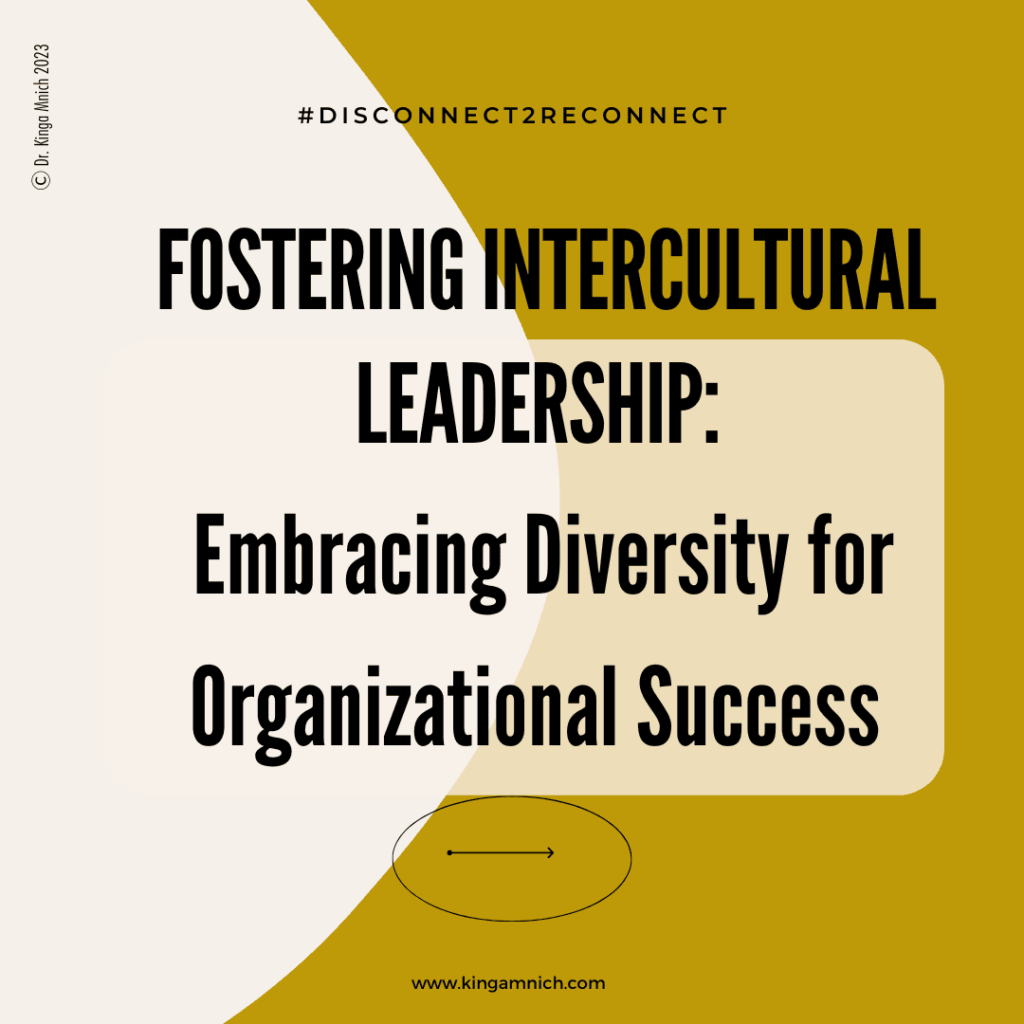In today's globalized world, organizations are increasingly diverse, encompassing individuals from various cultural backgrounds. To thrive in this multicultural environment, organizations must cultivate intercultural leadership, which enables leaders to navigate and harness the power of diversity effectively. This blog post will explore strategies for fostering and improving intercultural leadership in organizations.
We talk a lot about DEI when it comes to organizational development. But can true inclusion truly overcome what is inherently built into the system and structure of a company? Or do we need to go beyond inclusion and not only celebrate diversity but create systematic change based on diversity?
Research has proven that diversity leads to greater productivity and more creativity and creates environments in which people become better problem solvers. It is a bit like having a diverse pool of DNA. Children with parents from diverse ethnicities are more resilient in all spheres of life, and genetic diversity is critical for a population to adapt to changing environments.
Companies are living ecosystems, and even though we use different terms than in biology, the components of a company are the same as in any healthy ecosystem: productivity, resilience, and organization (including biodiversity).
To ensure smooth operation, all three components must be intact (which may explain why so many existing companies are exploiting our natural resources due to the lack of understanding of their significance).
Let’s get to the main point of this article: Diversity and intercultural leadership. Diversity is not only a hip term or a movement against systemic racism and discrimination. Diversity is a critical signifier of how well-equipped a company is in facing adversity, fostering innovation, and building an organization characterized by flexibility and sustainable growth.
According to McKinsey, the more diverse an organization is, the more profitable it is. What’s even more interesting is that the more diverse an organization is, the more sustainable it is. Diversity and inclusion is not only the just thing to do but also the only feasible way for us to move forward as a society.
Intercultural leadership is, therefore, not just another pop culture term but a main skill set in today's work environment. Let’s face it, despite the growing movement of #shoplocal, globalization is increasing and will continue to increase simply because it can benefit the greater good. That’s why most organizations operate in diverse cultural contexts and engage with people from different backgrounds because they have to and because it increases the company's productivity.
How do we foster intercultural leadership?
Intercultural leadership enables leaders to navigate and effectively manage diverse teams, stakeholders, and markets across borders. It helps organizations adapt to their global operations' cultural nuances and diversity.
Here are 7 ways how you can foster intercultural leadership:
Develop Intercultural Competence:
- Building intercultural competence is fundamental to effective intercultural leadership. Organizations can offer training programs, workshops, or cultural immersion experiences to enhance leaders' understanding of different cultures, traditions, and communication styles. This enables leaders to develop empathy, adaptability, and a broader worldview, allowing them to navigate cultural differences with sensitivity and respect.
Create Inclusive Environments:
2. Inclusivity is the cornerstone of intercultural leadership. Organizations should foster an inclusive culture that celebrates diversity, where individuals from all cultural backgrounds feel valued and respected. This can be achieved by promoting diverse representation at all levels of the organization, encouraging open dialogue, and providing opportunities for cross-cultural collaboration. Inclusive environments empower leaders to leverage diverse perspectives and experiences, fostering innovation and creativity.
Encourage Cultural Intelligence:
3. Cultural intelligence refers to understanding and adapting to different cultural contexts. Organizations can encourage leaders to develop cultural intelligence by providing resources such as books, articles, and podcasts on intercultural topics. Additionally, leaders should be encouraged to engage in intercultural experiences, such as international assignments or mentorship programs that facilitate cross-cultural learning.
Facilitate Cross-Cultural Communication:
4. Effective communication is vital for intercultural leadership. Organizations should encourage leaders to develop active listening skills, practice clear and concise communication, and be aware of cultural nuances in verbal and nonverbal communication. Providing language training or interpretation services can also facilitate communication across cultural boundaries, ensuring that messages are accurately conveyed and understood
Foster Collaborative Teamwork:
5. Intercultural leadership thrives in collaborative team environments. Organizations should promote diverse team compositions, allowing individuals from different cultures to collaborate on projects. This fosters mutual learning, respect, and appreciation for different perspectives. Leaders should create a safe space for team members to express their ideas, encourage open dialogue, and facilitate conflict resolution when cultural differences arise.
Recognize and Reward Intercultural Leadership:
6. To foster intercultural leadership, organizations should recognize and reward leaders who demonstrate inclusive behaviors and effectively manage cultural diversity. Recognition can take various forms, such as highlighting success stories in internal communications, implementing performance metrics that assess intercultural leadership skills, or providing opportunities for leadership development and advancement for those who excel in intercultural competence.
Lead by Example:
7. Leadership is pivotal in setting the tone for intercultural collaboration. Leaders should lead by example, exhibiting inclusive behaviors, promoting diversity, and actively seeking diverse perspectives. When leaders embrace intercultural leadership, it sends a powerful message, encouraging others to follow suit.
In summary:
Fostering and improving intercultural leadership is vital for organizations operating in a diverse and globalized world. By developing intercultural competence, creating inclusive environments, encouraging cultural intelligence, facilitating cross-cultural communication, fostering collaborative teamwork, recognizing intercultural leadership, and leading by example, organizations can harness the power of diversity and drive sustainable success. Intercultural leadership enhances organizational performance and cultivates a culture of respect, understanding, and innovation that benefits individuals and society as a whole.
And a pro-tip personal holding leading roles within organizations should have international experience. We can understand as much as we want. Having experienced living and navigating through a foreign culture is necessary to develop the sensibility that an intercultural leader needs. It is all about feeling the difference that enables us to foster a flexible mindset that allows us to be sensible to intercultural dynamics and potential frictions.
Studies:
McKinsey & Company (2018) "Delivering Through Diversity"
Catalyst (2020) "Why Diversity and Inclusion Matter: Financial Performance"
Harvard Business Review (2013) "How Diversity Can Drive Innovation"
Boston Consulting Group (2028) "How Diverse Leadership Teams Boost Innovation"
Harvard Business Review (2020) "The Business Case for Curiosity"
Tanachia Ashikali, et al. (2020) The Role of Inclusive Leadership in Supporting an Inclusive Climate in Diverse Public Sector Teams












